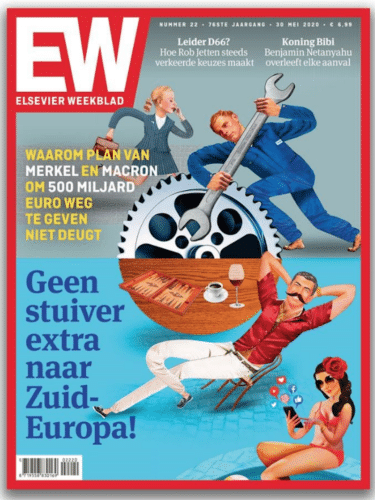In common European narratives, Italy is “Europe’s sick man,” incapable of keeping its books as rationally as the so-called “frugal” countries. But the data tells another story. We got in touch with the Austrian economist behind the Campaign Against Italy Nonsense (#CAIN)
“I am today launching a small Twitter initiative, the Campaign Against Italy Nonsense (#CAIN). I’ll be tweeting data and arguments for countering myths about Italy’s state and economy.” With this tweet Philipp Heimberger, an Austrian economist at the Vienna Institute for International Economic Studies, set out on his multilingual mission to challenge the European bias against Italy.
Aside from his clear, data-driven analysis, Mr Heimberger’s campaign is newsworthy because of the sheer scarcity of Europeans holding similar views. As the common narrative has it, Italy weighs down and endangers the rest of the Eurozone by means of fiscal irresponsibility (i.e. high public debt), low appetite for structural, efficient reforms, and a dash of stereotypical “laziness.”
These views are held in some of the most vocal Eurozone countries, as the economist underscored. Were it not for Germany’s intervention, last summer’s battle over the EU’s recovery funds would have tilted towards the rigorous moderation championed by the “Frugal Four”: Austria, Denmark, the Netherlands and Sweden.

Those countries initially resisted a joint recovery effort, because they were uncomfortable with lending their credibility to issue European common debt to be enjoyed by “big spender” countries. Thereafter, they fought to reduce the funds and increase checks and conditions. Conceivably, the Frugal Four partially based their reasoning on Italy’s reputation as a failing economy, as the Southern European country was to be the biggest beneficiary of European funds.
But those prejudices – which are also shared by many Italians – are awfully out of touch with reality. Here are some data-founded truths out of the Austrian’s myth-debunking threads: Italy has been a net contributor to the EU for the past decades, it has undergone more fiscal consolidation that any other European country, it’s an industrial behemoth, it produces more than it consumes (i.e. it does not “live above its means”) and its private debt is actually much lower than other OECD countries.
“My impression is that in this country of 60 million people, the stagnation of the last 20 years has been a breeding ground for fatalism rather than optimism,” Mr Heimberger told Formiche.net; “[a]ll the more reason for media and politicians in Germany, Austria and beyond to refrain from treating Italy like a southern European patient who is having problems because he refuses the reform medicine of the northern European doctor. This is just flawed and counterproductive, the data clearly reject this narrative.”
The economist is well aware of Italy’s structural problems, which encompass the oversized banking sector, the public administration, bureaucracy and the North/South divide – but “what country doesn’t [have any]?” The crux lies in the fact that Italy’s fragility – or its strength – translates directly to fragility, or strength, of the entire European system.
“Italy is the third-largest Eurozone economy, its banking sector is huge, and the country is systematically important in the Eurozone and in the EU. The stagnation of the Italian economy over the last 20 years is a real problem. If economic and political developments in Italy turn out negatively, this would be a potentially fatal blow to the European integration project,” Mr Heimberger told us.
He also mentioned that many users shared his feeling that something had to be done to reduce this perceptive distortion. Some of them had even translated his tweets into Dutch, he recounted, to make them available in the Netherlands. But a minority pushed back, rejecting his narrative.
“We need to look at the facts, evaluate economic policy honestly and do better. This is my view, and I hope that my small Twitter initiative is seen both as a gesture of solidarity towards the Italian population and as a wake-up call to European political leaders.”
His latest tweets coincide with the birth of Italy’s new government. steered by the former head of the European Central Bank Mario Draghi. The economist believes that Mr Draghi, who is tasked (and trusted) with overhauling the Italian economy, could well be the beginning of a “New Southern European Policy.” One based in evidence and shared value, and not the opposite.
I am today launching a small twitter initiative, the Campaign Against Nonsense about Italy (#CANI). I’ll be tweeting data and arguments for countering myths about Italy’s state and economy. In this thread, I’ll explain why I think this is necessary /1 pic.twitter.com/vSSpaj6JMx
— Philipp Heimberger (@heimbergecon) February 6, 2021
Cover picture credit: EW Magazine, May 2020 – https://www.ewmagazine.nl/








